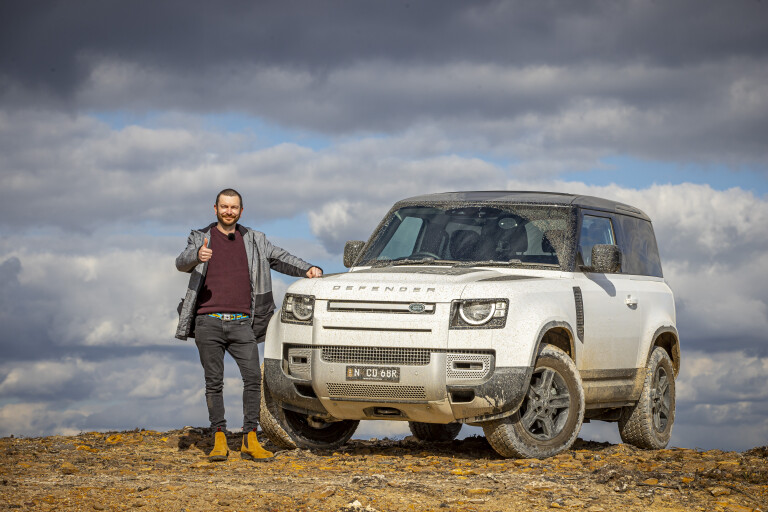
Things we like
- Off-road capability is right up there
- Powerful and comfortable on and off road
- Excellent interior design and layout
Not so much
- It’s certainly not cheap
- Heavy tailgate caught me out when parked on a slope
- Lack of provisions for aftermarket accessories
IT’S not every day you get to drive a stripped-back base model short-wheel base four-wheel drive, with a price tag of more than $95,000. It was certainly a first for me, but it’s exactly what this D200 Land Rover Defender 90 you see before you is.
In saying that, it’s really hard to say this is a pov-pack model, far from it. In this current Defender line-up though, this is essentially as basic as it gets. And I for one, am fine with that.
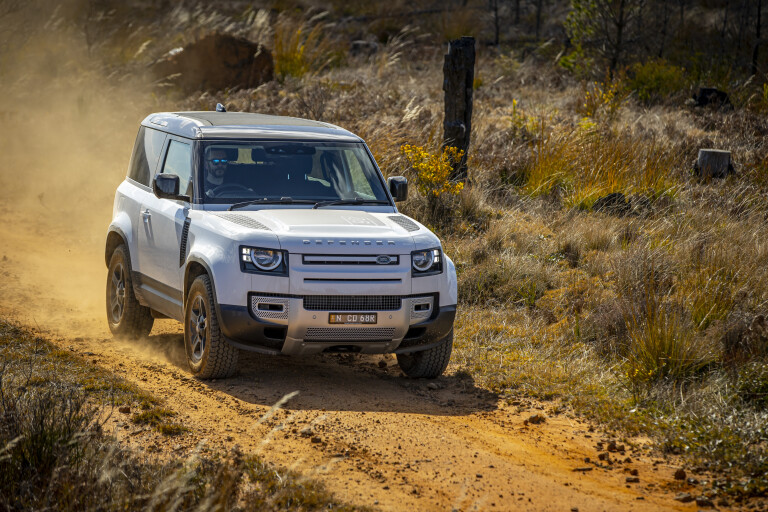
This particular example has been decked out with a bunch of factory fitted accessories, such as alloy wheels (yes, I know, you all want the white steel wheels), a folding canvas electric roof and a smart rear-view mirror.
Inside though, it’s still a mostly practical affair, clad with rubber flooring and cloth seats. This Defender as tested, is also riding on coil springs, not the optional air-suspension which we’ll touch on later.
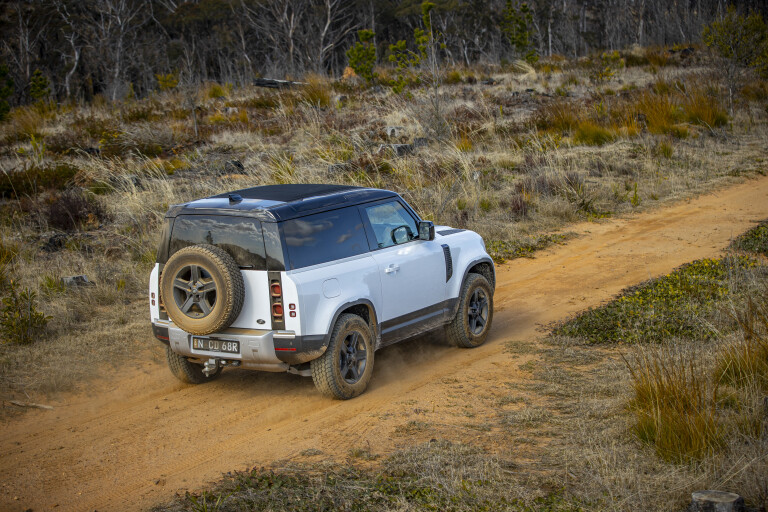
I wanted to focus largely on the off-road ability of the Defender 90 in this review, because this is where a SWB 4x4 should shine. But if you want to see how it performs on road, check out this review from our sister publication Wheels.
With that out of the way, let’s get down and dirty and see what the D200 Defender 90 is like to drive.
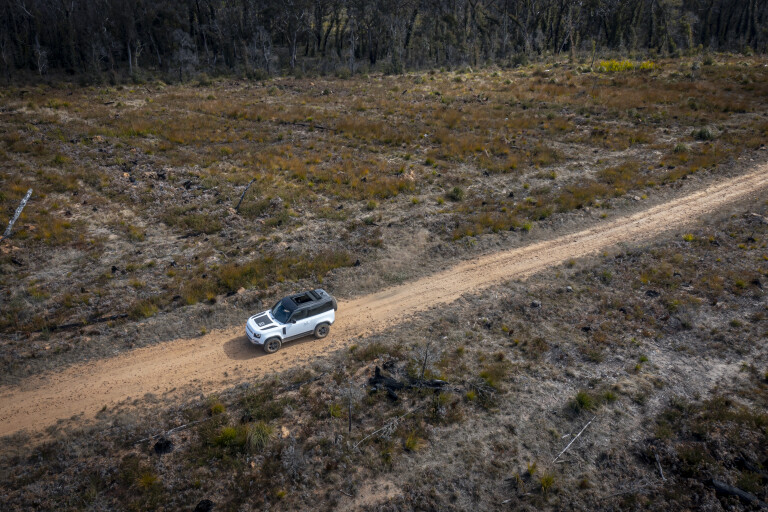
POWERTRAIN & PERFORMANCE
WITH 500Nm of torque and 147kW available, the D200 Defender 90 is no slouch. Far from it.
Combine that with an 8-speed automatic gearbox, the 3.0L twin-turbo in-line 6-cylinder engine moves 2236kg of Land Rover around with brisk ease. Power delivery is smooth and linear, the engine actually sounds nice in the process as well.
Interestingly, Land Rover provide a claimed top speed for the D200, which they say tops out well over the speed limit at 175km/h. Naturally, we can’t confirm nor deny this.
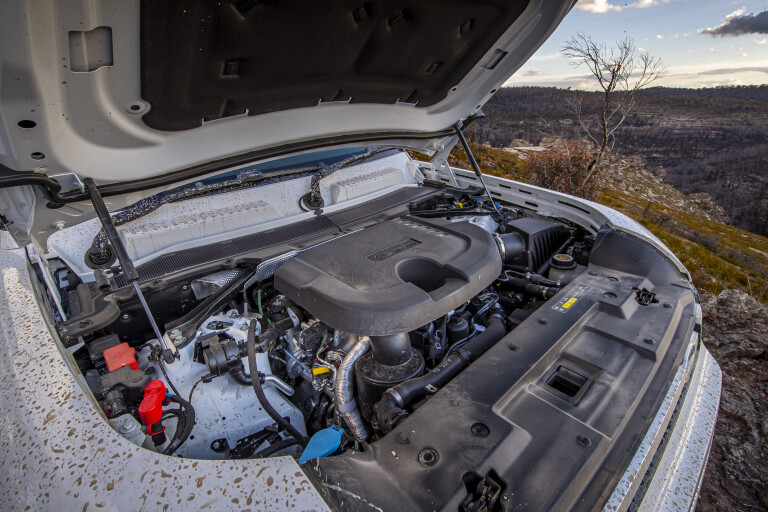
This engine, Land Rover’s marketing team have dubbed as the Ingenium series, also features a mild hybrid (MHEV) system, which I’m not going to pretend to understand. But I also don’t understand how to rebuild the carburettor on my Suzuki Sierra.
The gist of it from my (limited) understanding, is this system generates, stores and makes available energy that would otherwise be wasted during deacceleration. This in theory should provide better fuel economy, and offer a boost in stored energy for power hungry inclusions such as Stop/Start function and the electronically controlled power steering. It requires no input from the driver thankfully, which was my first question upon picking this Defender up.
It must be said though, this certainly is now a complicated vehicle, a far cry from the Defender of old which could be fixed with a brick and a positive attitude. On the flip side, it’s refined and powerful; something the previous generation Defender never was nor could be.
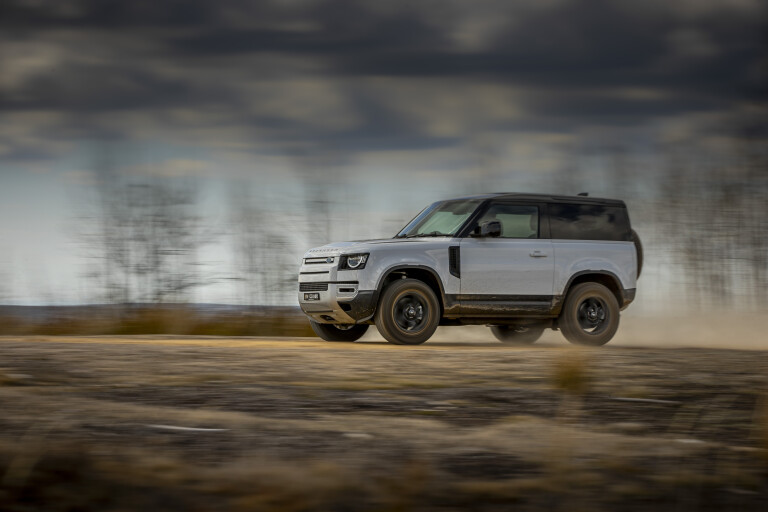
ON-ROAD RIDE & HANDLING
I FIND it a bit strange, that this Defender 90 actually has a wheelbase of 101.9 inches. It goes against the heritage of the original Defender 90, but considering how nicely this vehicle rides on road, I can forgive this.
It steers, drives and stops better than any SWB four-wheel drive I’ve ever piloted. And I’ve owned a few. Putting this down solely to the longer wheelbase wouldn’t be accurate, but it certainly helps the cause.
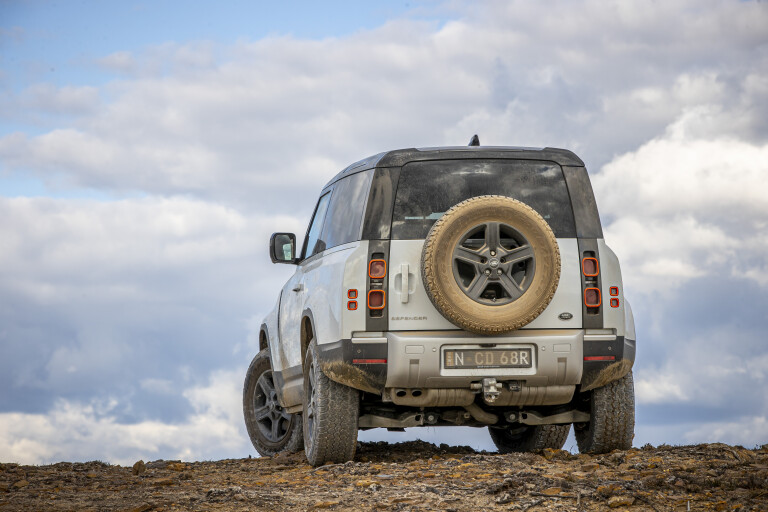
While I was disappointed that this test vehicle wasn’t equipped with adjustable air suspension at first, but this was also a great opportunity to see how the coil sprung D200 performs.
I must say, the ride and handling characteristics of the D200 are spectacular for what it is. While having adjustable ride height at the push of a button would be handy off road,
I can confirm there’s no reason to not recommend the coil suspension from a ride point of view if looking for something simpler, cheaper and arguably more reliable. Personally, I’d pay the extra for the air suspension.
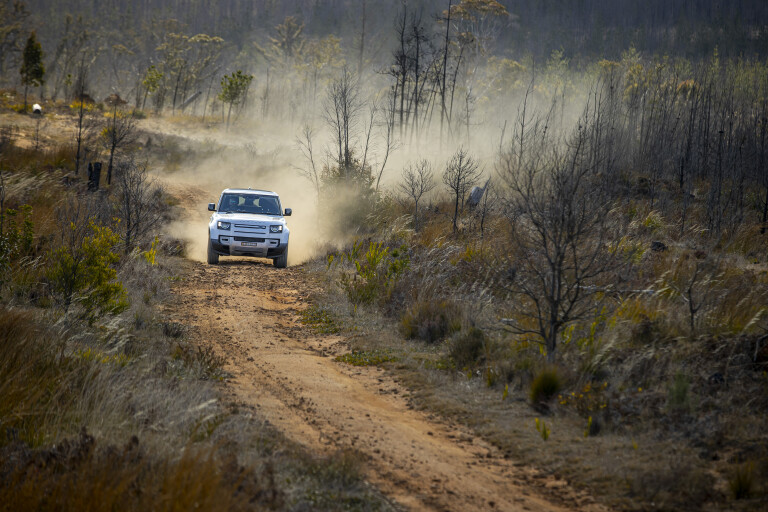
Steering feel is well-weighted, and the all-wheel drive system grips to the road with stubborn tenacity. One look at the brakes fitted behind the 18-inch wheels, and you know they mean business.
And they do, braking performance is first class. This is a very long way removed from the last Defender 90 I drove in terms of on-road ability, love it or hate it. But does this improved on-road comfort come at the cost of the Defender’s off-road ability?
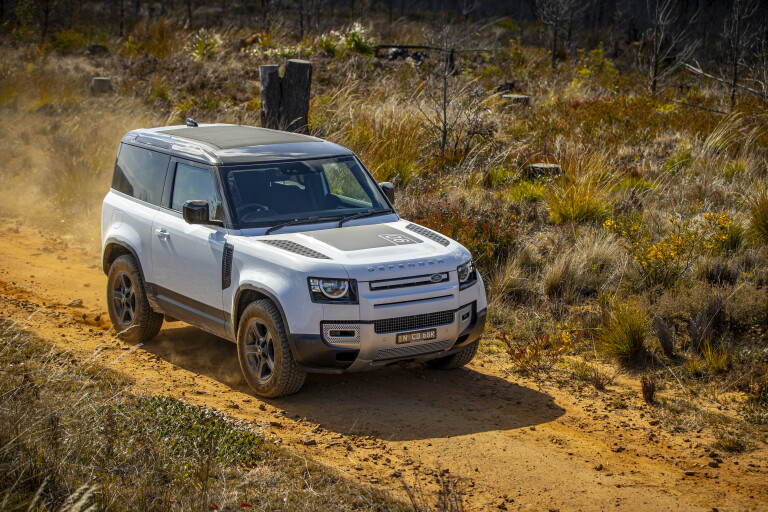
OFF ROAD
THIS thing is properly capable off road. There, I said it. As I expected from a short(ish) wheel base 4x4 with independent coil suspension on all four corners though, this Defender didn’t have much suspension travel.
It picked up a wheel or two easily. Yet, somehow felt incredibly stable in the process. Fun even! What it lacks in suspension travel, it makes up for in ride comfort over rough terrain.
I can only dream about driving one with high-quality aftermarket remote res shocks and a bit of lift on dirt at pace. Still, in standard trim this 90 was at home on the dirt.
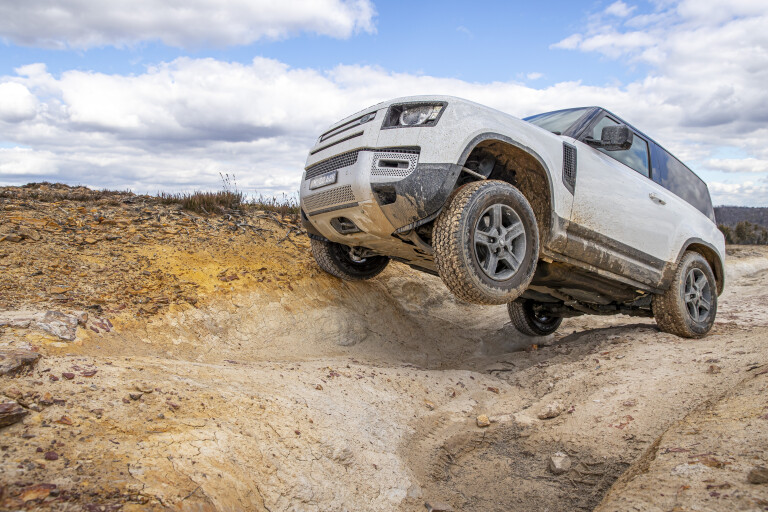
As things started getting more serious, I worked out pretty quickly that as long as one wheel was on the ground, thanks to the insanely good traction control system found in the Defender, it will just keep pushing forward.
There wasn’t the need to feed large amounts of throttle input to engage tyres with grip either. It’s easy to navigate the various traction modes via the touchscreen once you know how, and I found myself switching between these modes religiously depending on what terrain I was experiencing.
I’m also a massive fan of the inbuilt cameras when set in off-road mode. This was some sort of wizardry you have to experience for yourself, it was an absolute asset to be able to see where the tyres were pointed at all times, resulting in no scratched rims on this press car.
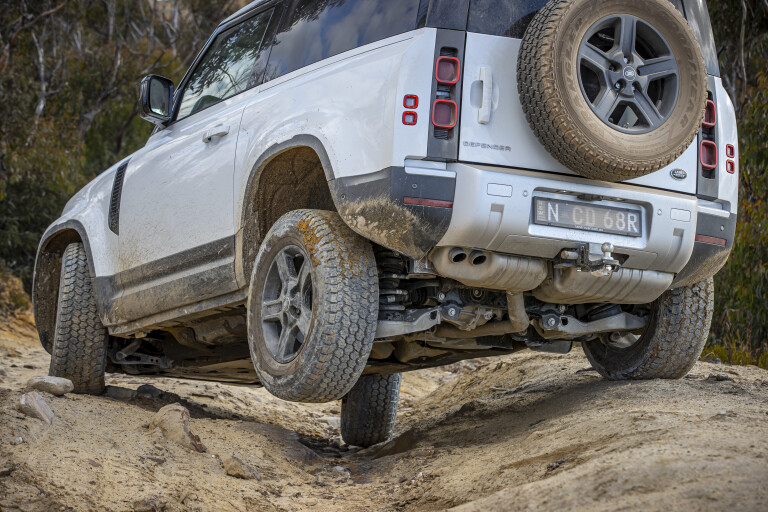
At no stage did I feel like traction was an issue, clearance though is the limiting factor in how hard I felt comfortable pushing a $100,000 vehicle that didn’t belong to me.
The underbody seems well tucked up, but could definitely do with more ground clearance in rough terrain. This is where ticking the box that says I’ll have the adjustable air suspension please, would have definitely come in handy.
It was also good to see a tyre pressure monitoring system built in, however it did seem like it was unhappy with me when tyre pressures were lowered for off-road work. Lights on a dash tend to worry me, but easily forgotten when you know they are doing their job.
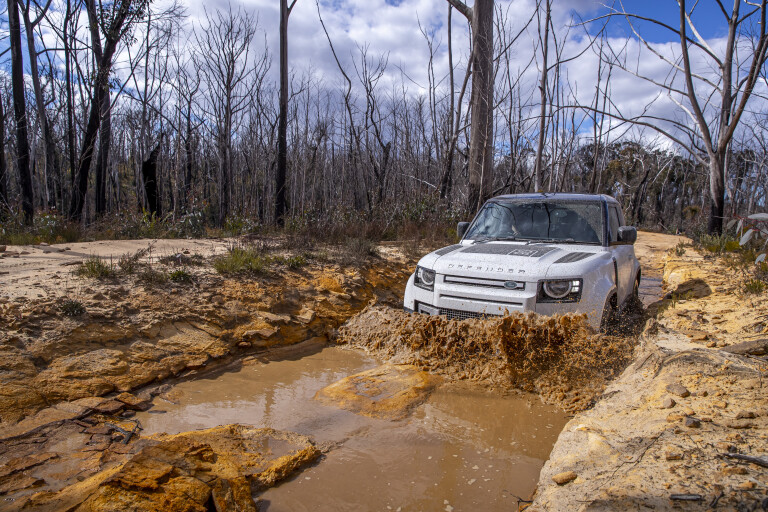
As you can see from the boxy rear end, the departure angle on the Defender 90 seems more impressive in the field than the 37.9 degrees listed in the sales brochure. Front-end clearance is a limitation though, despite a claimed approach angle of 31 degrees.
If you managed to get the front through an obstacle, you knew the rear end would follow. And while the breakover angle wasn’t superb, again everything is well tucked up allowing you to slide through.
It was also good to see the exhaust tips were tucked up high and protected at the rear end. I also really enjoyed the long-travel accelerator which is a throwback to the first 4x4 I ever drove, a 1988 Range Rover Classic. It’s a handy feature when driving in technical terrain; you can ease the throttle on-or-off with greater control. It must be mentioned that Land Rover claim a wading depth of 850mm with these coil-sprung models – not a bad figure at all.
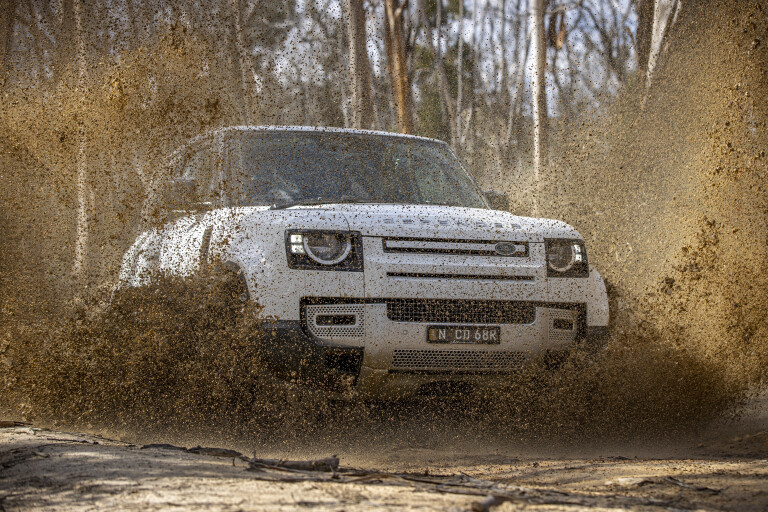
CABIN & ACCOMMODATION
GENUINELY, I feel this is one of the nicest modern interiors layouts (that still had a rubber floor covering) I’ve had the privilege of sitting in. Practical, yet still makes you feel special.
You want to jump back inside, because it’s a nice place to be. The seats are comfortable, and the width of the vehicle provided a spacious feel. You could drive all day in this Defender (with regular breaks naturally) and not feel sore or tired.
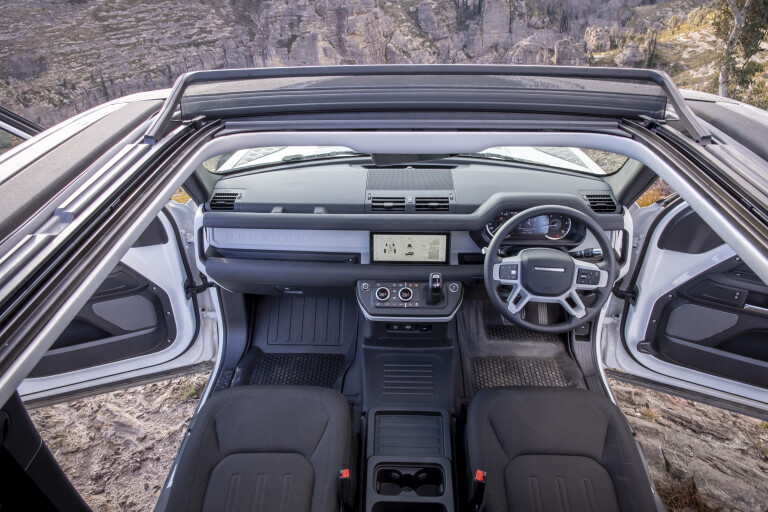
I like the central layout with all switches, gear selector and touchscreen mounted close to each other, and the unique walk-through design; sort of like a van. One of the genuine accessories fitted to this test vehicle, was the electronically folding canvas roof which is a brilliant addition. Easy to use and when opened, provided a near soft top experience, but without the wind noise and messy hair.
Considering this option costs $4810 you’d expect it to be nice, and as Editor Matt said to me, you’d have to really want that feature for that money. I’m also curious about the longevity of such a product in the harsh Aussie sun, but I’m keen to hear your thoughts about it. Would you pay nearly $5000 for this option?
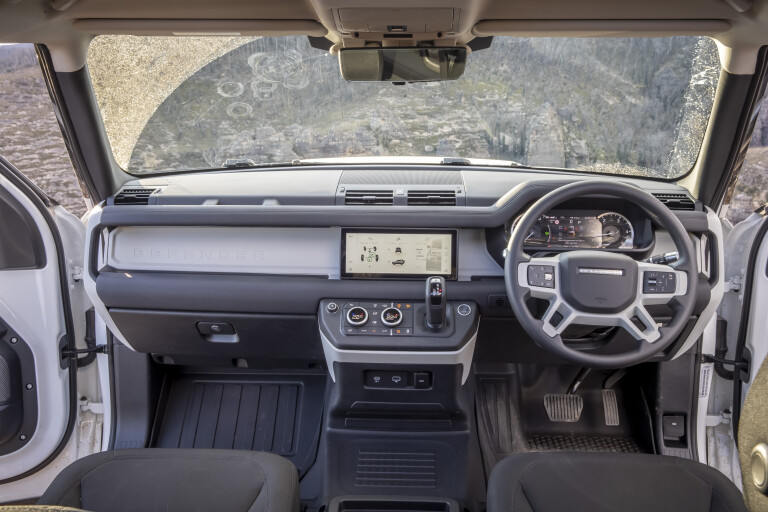
PRACTICALITIES
IF you have a family, this probably isn’t the right vehicle for you. But you already knew that. Sure, it has five seats and they are comfortable but with the rear seats up, there is very limited cargo space behind them.
I managed to fit an ARB twin compressor in a hardcase depth wise, and that was a squeeze (to put the space in to perspective). I think if you wanted a Defender 90, and had to use the back seats for passengers, you’d need a trailer to do anything useful.
It’s rated to tow 3500kg braked, so would be a valid solution. There is plenty of height though, so you could possibly get creative with a cargo barrier to capitalise on this real estate.
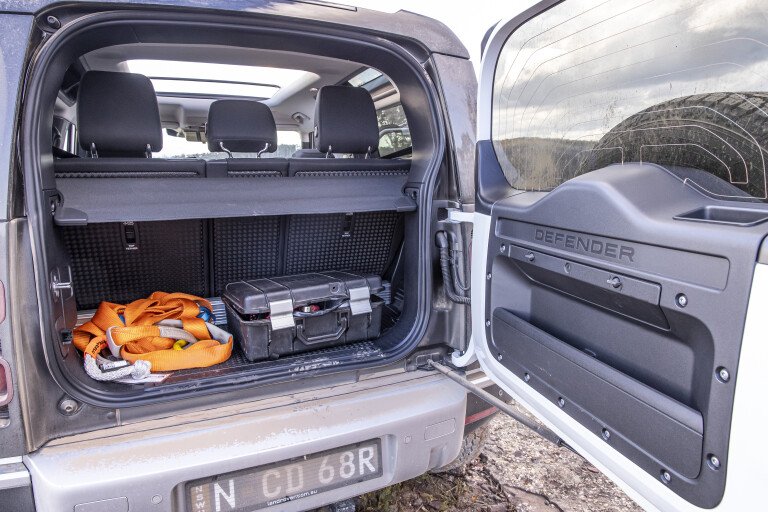
I live on a steep hill and with the spare tyre mounted on the tailgate, it was rather difficult to close said tailgate when parked on said incline. It’s heavy. Not a deal breaker if you’re stronger than me, but worth mentioning as it could present a challenge. I didn’t have this problem with the Suzuki Jimny, with a rear mounted tyre on the same patch of concrete.
Something that certainly could be a deal breaker, is the distinct lack of blanks to mount switches for aftermarket accessories. There was only one that I found, which was already occupied with a Redarc Tow Pro dial.
And while I know you can’t get many aftermarket accessories for the Defender in Australia yet, and there doesn’t seem to be many plans to change this, what if you just want a basic set of driving lights? You will need to look at an accessory management system, and a way to mount it to avoid making swiss cheese of the lovely looking dash. I’m not mad, just disappointed Land Rover. A missed opportunity indeed.
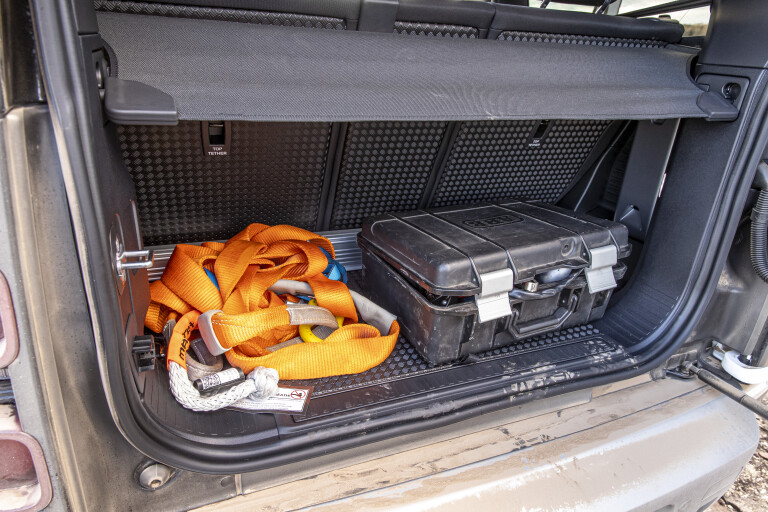
CONCLUSION
THIS Defender 90 D200 isn’t anything like the Defender of old. In my opinion (ducks for cover while pop rivets get hurled in my direction) it’s better than the previous 90. Sure, it’s more complicated and expensive, but everything these days is essentially.
The D200 is a great mix between being practical and classy, easy to steer during the week and very capable in the bush on weekends.
It’s powerful, comfortable and I feel looks brilliant in 90 guise compared to the 110 Defender (again, in my opinion). But let’s be honest, many feel it’s really just a Defender by name. And it is early days for this platform.
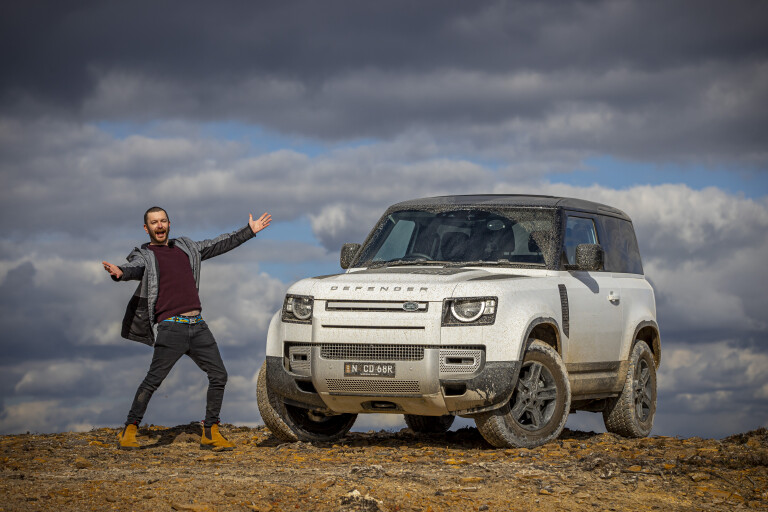
What I don’t like, is the lack of aftermarket accessories available, as I feel you could have a lot of fun building one up for proper off-road work. Fingers crossed the aftermarket industry in Australia comes to the party eventually.
It’s also too expensive, but I also said that about the Suzuki Jimny (for what it is), so maybe I’m just cheap?
It begs the question though, is the Defender 90 the most capable SWB four-wheel drive on the market today, or would the Suzuki Jimny or Jeep Wrangler take that title? That is one shoot-out we’d be more than happy to organise, and I feel the results would be closer than you’d think.
Land Rover Defender 90 D200 specifications
| ENGINE | 3.0L inline six-cylinder twin-turbo diesel (Mild Hybrid MHEV) |
|---|---|
| MAX POWER | 147kW at 4000rpm |
| MAX TORQUE | 500Nm at 1250 to 2250rpm |
| GEARBOX | 8-speed automatic |
| 4X4 SYSTEM | Full-time 4x4 w/ Terrain Response |
| WHEEL/TYRE | 18in wheels / 255/70R18 |
| KERB WEIGHT | 2236kg |
| GVM | 2970kg |
| GCM | 6470kg |
| PAYLOAD | 734kg |
| TOWING | 3500kg (braked) |
| FUEL TANK | 89L |
| ADR FUEL CLAIM | 7.9L/100km |
| TEST FUEL USE | 9.8L/100km |
| AS-TESTED PRICE | $95,679 before on-road costs (including factory accessories) |
Land Rover Defender 90 D200 off-road specs
| DEPARTURE ANGLE | 37.9⁰ |
|---|---|
| RAMPOVER ANGLE | 25⁰ |
| APPROACH ANGLE | 31⁰ |
| WADING DEPTH | 850mm |
| GROUND CLEARANCE | 225mm |
Things we like
- Off-road capability is right up there
- Powerful and comfortable on and off road
- Excellent interior design and layout
Not so much
- It’s certainly not cheap
- Heavy tailgate caught me out when parked on a slope
- Lack of provisions for aftermarket accessories



COMMENTS